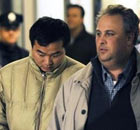Top Biz News
China's move to raise bank reserve ratio draws global response
(Xinhua)
Updated: 2010-01-14 10:39
 |
Large Medium Small |
The decision of the People's Bank of China (PBOC), the central bank, to increase the deposit reserve requirement ratio has drawn worldwide attention and fluctuations in global markets.
The PBOC decided on Tuesday to raise the deposit reserve requirement ratio by 0.5 percentage points as of Jan 18, which analysts translated as a move to manage inflationary expectations and avoid a recurrence of the lending boom.
This was the first time that the PBOC adjusted the ratio of deposit that lenders are required to set aside since the end of 2008 and the first increase for the ratio since June 2008.
The PBOC cut the bank reserve requirement ratio four times in the second half of 2008 to stimulate growth as the global financial crisis started to weigh on the economy.
The adjustment of the reserve requirement ratio, without changing benchmark interest rates, indicated the central bank was targeting inflationary expectations instead of inflation, said Zhao Qingming, a senior researcher at the China Construction Bank.
Ma Jun, chief economist with Deutsche Bank (Great China), said that the rise in the reserve requirement ratio has ended the expansionary monetary policy and started a tightening cycle.
Global markets took a hit after the Chinese attempt to cool the world's fastest-growing major economy.
Chinese equities saw their sharpest dip in seven weeks on Wednesday after the central bank asked lenders to set aside more reserves as record bank lending last year ignited fears of inflation and asset bubbles.
The benchmark Shanghai Composite Index went down 3.09 percent, or 101.31 points, to close at 3,172.66 points.
The Shenzhen Component Index lost 2.73 percent, or 364.69 points, to close at 13,016.56 points.
Hong Kong stocks shed 578.04 points, or 2.59 percent, to close at 21,748.60 on Wednesday.
The Hong Kong market was also dragged by overnight losses on the United States markets. The benchmark Hang Seng Index opened down 1.42 percent and widened its losses to 2.24 percent by lunch break, and further to 2.59 percent by market close.
South Korea's financial markets on Tuesday reacted as the Chinese central bank raised the deposit reserve requirement ratio, with the stock markets and foreign exchange rate plunging from the last close.
The benchmark Korea Composite Stock Price Index (KOSPI) and the Korean Securities Dealers Automated Quotations (KOSDAQ) jointly marked a plunge of 27.23 points and 3.65 points, respectively, from the last close.
The report from China also affected the foreign exchange market, with the local currency also sliding against the US dollar by 1.9 won.
The New Zealand share market also fell on Wednesday after the Chinese move.
The share market closed 0.43 percent lower with the benchmark NZSX-50 down 14.1 points at 3,276.2.
Canadian stocks fell for the second day, weighed down by a metal and mining sector that was hit by the Chinese central bank's decision to cool economic growth.
The S&P/TSX Composite Index declined 126.94 points, or 1.06 percent, to 11,820.18 on Tuesday. Earlier the index shed 173 points to 11,774, the lowest level this year.
US stocks retreated Tuesday, with S&P falling for the first time in 2010, as disappointing Alcoa fourth-quarter results and rising US trade deficit cooled optimism for a strong earnings season and a sustainable economic recovery.
Crude tumbled the most in five weeks on concerns that demand from China, the world's second-largest oil consumer, will wane as the government moves to curb lending.
Meanwhile, analysts widely hold that the Chinese central bank's decision is to cast only a short-term, instead of mid-term, stroke on the domestic stock market, as the impact would largely be psychological.
Zhuang Jian, a senior economist with the Asian Development Bank, said the adjustment did not indicate a shift in the moderately easy monetary policy, but was an effort to control the pace of lending.
Through the reserve requirement ratio increase, the central bank intended to call for balanced lending at commercial banks, which would support economic growth while avoiding higher inflationary expectations, Zhuang said.













